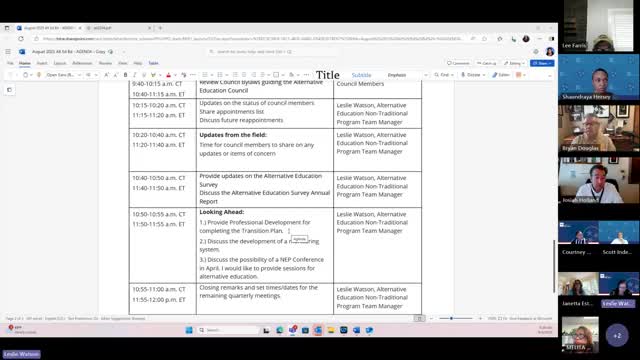Council flags inconsistent placement pathways and plans monitoring, PD on transition planning
Get AI-powered insights, summaries, and transcripts
Subscribe
Summary
Council members raised concerns that district practices vary on who is placed in alternative programs and how long students remain, noting legal and operational friction points including recent search-law changes and a lack of consistent monitoring.
Council members spent a substantial portion of the session discussing inconsistencies in how students enter and exit alternative education placements, concerns about recent search-law changes and the need for a monitoring system and professional development to support best practices.
Josiah Holland said the pathway into and out of alternative schools can be "very inconsistent" across districts and asked whether the council could provide clarity, including whether students in state custody were being automatically placed in alternative settings. He asked whether districts could effectively "expel" students from public education for long periods and noted varying local practices about removal and re-enrollment.
Legal counsel Shondrea Hershey responded that the law provides flexibility for nontraditional programs and that directors have discretion to place students based on discipline history and needs, adding that state board rule supports some program-level variation. "There's definitely flexibility as it relates to building these nontraditional programs that serve multiple student populations," she said.
Members raised recent search-law changes discussed at TAEA that limit who may conduct searches of students and their property to school resource officers acting as school officials, school security officers or trained school administrators; members said many alternative programs lack on-site SROs, creating practical challenges for school operations. Members also discussed restorative practices, hybrid program models that blend discipline and credit-recovery functions, and the need to include alternative settings explicitly in RTIB/MTSS frameworks and monitoring tools.
To address these gaps, Watson proposed at least two virtual training sessions focused on transition planning (fall and spring) and asked council members to bring suggestions for a monitoring system to the next meeting. Members recommended qualitative site visits and the development of an instructional-practice guide that could be used both for reflective improvement and as the basis for monitoring. Josiah suggested pairing quantitative survey data with qualitative evidence collected through visits to create a more powerful monitoring instrument.
The council did not adopt new legal rules; instead members directed staff to draft PD offerings and monitoring options and to return with proposed language and formats for future consideration.
